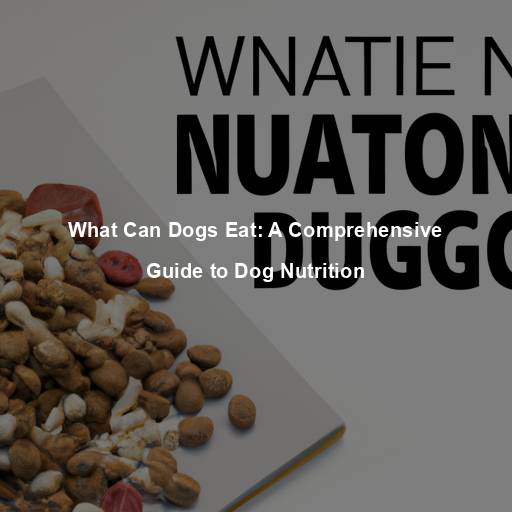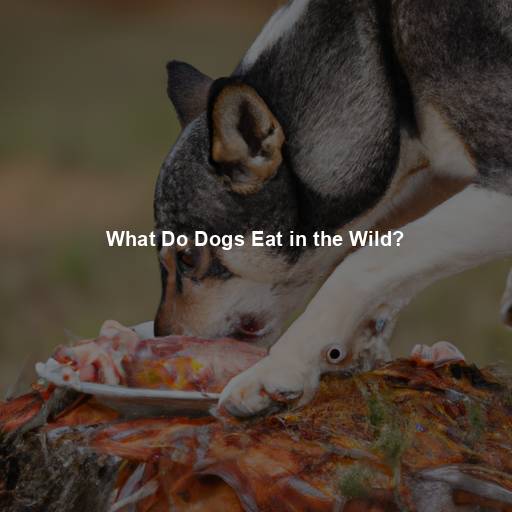What Can Dogs Eat: A Comprehensive Guide to Dog Nutrition
Last Updated on October 21, 2023 by Evan
Contents [hide]
Understanding Dog Nutrition
Dogs are not just pets; they are treasured members of our families. As responsible pet owners, it is our duty to ensure their well-being, and one crucial aspect of their health is nutrition. Feeding our furry friends a balanced diet is essential for their overall health, longevity, and vitality. But what exactly can dogs eat?
The Basics of a Balanced Diet
Just as we humans need a diverse range of nutrients to keep our bodies in top shape, dogs also rely on a balanced diet for their overall well-being. From proteins to carbs, fats to vitamins, and minerals, each component plays a unique role in their growth, development, and general health. It’s crucial to grasp the concept that dogs possess their own set of dietary requirements, distinct from ours. While there may be some overlapping foods between our tables, it’s essential to note that certain items deemed safe for us can pose potential harm or even toxicity to our furry friends.
Proteins: The Building Blocks of Canine Health
Proteins are essential for dogs as they provide the necessary amino acids required for various bodily functions. High-quality protein sources such as lean meats, fish, and eggs should form the foundation of your dog’s diet. These proteins aid in muscle development, repair tissues, support a healthy immune system, and contribute to healthy skin and coat. Incorporating proteins into your dog’s meals ensures they receive the necessary nutrients to thrive.
Carbohydrates: Energy for Active Pooches
Dogs, these fascinating creatures with their seemingly insatiable energy levels, certainly have unique dietary needs. Although their carnivorous nature is well-known, it may come as a surprise that they possess the ability to effectively break down and utilize carbohydrates. Whole grains like the ever-reliable brown rice and the humble oats, as well as nutrient-packed vegetables like sweet potatoes and peas, present themselves as excellent sources of these complex carbohydrates. Not only do they offer a reliable and consistent energy supply, their fiber-rich properties further augment the digestion process and promote a balanced weight.
Fats: Essential for Canine Health
Fats often get a bad reputation, but they are crucial for dogs’ overall health. Healthy fats are a concentrated source of energy and play a vital role in nutrient absorption. Incorporating fats into your dog’s diet helps maintain healthy skin and a glossy coat. Additionally, fats are necessary for the absorption of fat-soluble vitamins, such as vitamins A, D, E, and K. Opt for healthy sources of fats such as fish oil, flaxseed oil, and chicken fat to promote optimal canine health.
Vitamins and Minerals: The Micronutrients
Vitamins and minerals are essential in small quantities for dogs to function properly. They are involved in various bodily processes, including metabolism, cell function, and immune support. While a well-balanced diet typically provides these essential micronutrients, some pet owners choose to supplement their dog’s diet with multivitamins or specific nutrient supplements. However, it’s crucial to consult with a veterinarian before introducing any supplements to ensure they are appropriate for your dog’s specific needs.
Safe and Healthy Foods for Dogs
As we delve into the realm of canine nutrition, it’s imperative to unravel the enigmatic world of essential nutrients. But fret not, for we have embarked on a quest to unearth a myriad of safe and wholesome victuals that can gracefully grace the palates of our furry companions. However, let us not be consumed by boundless excitement, for restraint is paramount. Proceed steadily and with prudence, introducing these gustatory delights to your dog’s diet with cautious enthusiasm, ensuring harmony between their sensitive digestive systems and novel culinary adventures.
Lean Meats: A Protein Powerhouse
When it comes to your furry friend’s dietary needs, lean meats like chicken, turkey, and beef can be a paw-some choice for a protein boost. These meats are packed with vital amino acids that dogs need to thrive and are paw-sitively easy to digest. However, it’s important to practice caution in the kitchen to ensure your pup’s safety. Remember to give their meal a boneless makeover, bid farewell to fatty excess, and cook the meat thoroughly – plain and simple, no seasoning adventures that could lead to troublesome tummy tales.
Fish: Rich in Omega-3 Fatty Acids
Fish, such as salmon and sardines, are not only packed with protein but also provide a healthy dose of omega-3 fatty acids. These fatty acids contribute to a healthy coat, reduce inflammation, and support brain function. When feeding fish to your dog, ensure it is fully cooked and free of any bones. Canned fish in water can also be an option, but be cautious of added salt or other preservatives.
Fruits: Nature’s Sweet Treats
If you’re contemplating expanding your furry friend’s dining choices, a fruity twist might just be the answer you’re looking for! Take a cue from nature’s vibrant palette and consider introducing your pooch to the luscious world of fruits. Go for crowd-pleasers like apples, blueberries, and bananas, as they’re not only delightful to taste but also packed with essential vitamins, minerals, and disease-fighting antioxidants. Although, here’s the catch – remember to play the role of that diligent pit-remover and seed-snatcher to ensure your pup’s safety, as these components can present a potential choking hazard or harbor unpleasant substances.
Vegetables: A Fiber-Filled Delight
Dogs, just like their human counterparts, can find nourishment in the vibrant world of vegetables. The array of options available can leave one in a state of captivating bewilderment. From the vibrant crunch of carrots to the tender embrace of green beans, these nature’s gifts offer a perplexing plethora of health benefits that can be seamlessly incorporated into their diet. Whether served au naturel, gently steamed, or kissed by the caress of heat, one must take caution not to drown these vegetable wonders in rivers of oil, butter, or tantalizing seasonings.
Dairy Products: Proceed With Caution
When it comes to dogs and dairy, the tolerance levels can be as puzzling as quantum physics. While a lucky few pooches seem to handle the creamy delights with ease, for others, it’s like navigating a labyrinth of lactose intolerance. Beware the telltale signs of stomach upset such as explosive bouts of diarrhea or a not-so-charming performance of the canine projectile vomiting routine. If your furry friend’s digestive system is on the sensitive side, it’s best to wave goodbye to dairy altogether and set sail on a yogurt voyage.
Foods to Avoid: Harmful and Toxic to Dogs
As we delve into the realm of canine nutrition, it is imperative to shed light upon the often-overlooked aspect of potential hazards lurking in our kitchens. While we have meticulously explored the safe and wholesome options for our four-legged companions, it is crucial to acknowledge the dire consequences that certain foods can have on their delicate systems. By steering clear of these treacherous edibles, we shield our beloved canines from impending perils and safeguard their overall vitality.
Chocolate: A Sweet Treat to Avoid
As pet owners, it’s essential to stay informed about potential dangers lurking within our homes. One such peril lies tantalizingly wrapped in shiny foil and delectable flavors: chocolate. This seemingly innocent treat harbors a hidden menace for our furry friends. Theobromine and caffeine, the culprits behind its heavenly taste, can transform an innocent indulgence into a bewildering nightmare for our beloved dogs.
Grapes and Raisins: A Hidden Danger
As pet owners, we often indulge our furry friends with treats and snacks, but it’s essential to tread carefully when it comes to grapes and raisins. These seemingly innocent fruits hold a dark secret, capable of wreaking havoc on our beloved canine companions. Despite years of research, scientists have yet to pinpoint the exact culprit behind this mysterious toxicity, leaving us perplexed and bursting with questions. To ensure our furry friends’ well-being, let’s adopt a cautious approach and abstain from feeding them any grapes or raisins, even in disguised forms like delectable baked goods or tantalizing trail mixes.
Onions and Garlic: Toxic Alliums
Did you know that onions and garlic, no matter how they are prepared, can possess harmful compounds that can actually harm your furry friend’s red blood cells and potentially cause anemia? It’s truly surprising how often these ingredients find their way into our everyday dishes, making it crucial for responsible pet owners like you to steer clear of sharing anything seasoned with onions or garlic with your beloved dog. Always be on your toes when it comes to co-dining with your pet, and don’t forget to double-check that any leftovers you offer them are completely devoid of these toxic substances.
Xylitol: Sweetener to Avoid
As pet owners, we need to be aware of the dangers that lurk within seemingly harmless treats. Xylitol, a common sweetener found in many sugar-free products, can pose a serious threat to our furry friends. It’s no secret that dogs have an uncanny ability to sniff out the most delicious morsels, but what they find enticing could spell disaster for their health. Causing a rapid decline in blood sugar levels and potential liver damage, even the smallest amounts of xylitol can prove fatal to our beloved canines.
Alcohol: No Drinks for Dogs
While indulging ourselves in a glass of wine or a festive cocktail, it’s essential to remember that our furry companions cannot partake in our boozy celebrations. Alcohol poses a serious threat to dogs, with a laundry list of adverse effects ranging from intoxication to potential life-threatening outcomes like coma or worse. It’s imperative to keep our four-legged friends safe by refraining from offering them any alcoholic beverages and diligently ensuring that they are well clear of spills or unattended glasses.
Consulting a Veterinarian: The Key to a Tail-Wagging Diet
Discover the ultimate guide to canine cuisine, packed with essential insights on the culinary preferences of our four-legged friends. However, let us not forget that each pup possesses a one-of-a-kind palate. From the breed-specific cravings to the age-appropriate delicacies, there’s a whirlwind of factors that add complexity to their dietary desires. Embrace the wisdom of veterinary virtuosos who will unleash the secrets of tailor-made nutrition, advising on specialized menus and unveiling the answers to all your gastronomic dilemmas.
The Benefits of Homemade Dog Food
Some pet owners prefer to prepare homemade meals for their dogs, as it allows them to have full control over the ingredients and ensures transparency in their dog’s diet. However, it’s essential to consult a veterinarian or a veterinary nutritionist before switching to homemade dog food. They can guide you in formulating a nutritionally balanced diet that meets your dog’s specific needs. Homemade dog food requires careful planning and consideration of the necessary nutrients, portion sizes, and potential allergens.
The Raw Food Diet Debate
In recent years, there has been a surge in the popularity of the raw food diet, also known as the “BARF” diet – an acronym that surely causes some raised eyebrows. This unconventional diet involves feeding dogs raw meat, bones, fruits, and vegetables, an attempt to harken back to their ancestral eating habits. Proponents of this diet rave about its potential benefits for a dog’s skin, coat, teeth, and digestion. However, it is important to recognize the presence of risks in this peculiar dietary choice.
Safe and Healthy Treats for Dogs
When it comes to treating your beloved furry friend, it’s important to make informed choices that prioritize their wellbeing. With countless options flooding the market, finding treats that tick all the boxes of safety, health, and nutrition can be quite the puzzle. To help you navigate this perplexing world, we’ve curated a selection of top-notch dog treats that will not only delight your canine companion but also keep their wagging tails brimming with burstiness.
Commercial Dog Treats
The market offers a wide variety of commercial dog treats, ranging from biscuits and dental chews to jerky and freeze-dried options. When selecting commercial treats, read the ingredient list carefully. Look for treats made with high-quality protein sources, whole grains, and natural ingredients. Avoid treats that contain artificial preservatives, flavors, or excessive amounts of salt or sugar.
Fruits and Vegetables
When it comes to treating your furry friends with something nutritious and delightful, Mother Nature has got you covered! Fruits and veggies can be surprisingly delightful for dogs, offering them a burst of flavors and a boost of wholesome goodness. Savor the sweetness of apple slices, savor the juiciness of blueberries, savor the refreshing crunch of watermelon (minus the pesky seeds), savor the crispness of carrots, and savor the green goodness of beans. However, like any mysterious journey, make sure to tread cautiously and avoid harmful options like grapes and onions.
Frozen Treats
As temperatures soar and the blazing sun beats down on our furry companions, finding ways to keep them cool becomes paramount. Enter the realm of frozen delights for dogs, where the possibilities are as tantalizing as they are endless. Whisking together a symphony of plain yogurt, luscious pureed fruits, or even a savory low-sodium chicken broth, you’ll be amazed at the taste sensations you can create. Carefully pour these concoctions into ice cube trays or opt for special silicone molds designed exclusively for doggie treats.
Homemade Treats
For those who find solace in the art of baking, exploring the realm of homemade dog treats can awaken a delightful burst of inspiration. With a myriad of online recipe treasures awaiting discovery, one can indulge in the creation of mouthwatering delights infused with dog-friendly ingredients like peanut butter, pumpkin, oats, and sweet potatoes. By crafting these treats from scratch, one can navigate the perplexing pathways of ingredient quality, catering to their four-legged companion’s discerning palate and dietary requirements. Yet, amidst this culinary adventure, one must tread carefully, always ensuring the ingredients chosen are safe for canine consumption, evading the lurking danger of potential allergens.
Feeding Guidelines and Portion Control
Maintaining a healthy weight is essential for a dog’s overall well-being and longevity. Obesity can lead to various health issues, including joint problems, heart disease, and a decreased quality of life. Establishing proper feeding guidelines and portion control is crucial to prevent overfeeding and maintain a healthy weight for your dog.
Follow Feeding Recommendations
When it comes to feeding our furry friends, the guidelines on commercial dog food packaging can be a helpful starting point. However, it’s important to recognize that every dog is a unique individual with their own specific needs. Factors such as metabolism, age, breed, and activity level can all come into play when determining the ideal portion sizes. To ensure your dog is getting the appropriate amount of food, it’s always best to consult with a veterinarian who can provide tailored advice based on your specific pooch.
Monitor Body Condition
Regularly monitor your dog’s body condition to ensure they are maintaining a healthy weight. The ideal weight can vary depending on the breed, so it’s important to familiarize yourself with the body condition scoring system. This system assesses your dog’s overall body shape, including the visibility of their waist and ribs. If you’re uncertain about your dog’s body condition, consult with your veterinarian for guidance.
Treats and Mealtime Rewards
When it comes to using treats in training and forging that special connection with your furry friend, it’s important to keep their waistline in mind. Balancing the joy of treats with your dog’s overall calorie intake is key. Remember, treats should never exceed 10% of their daily caloric allowance. For a mindful approach, consider breaking treats into smaller, bite-sized portions to keep the calorie count in check.
Regular Exercise
Alongside a balanced diet, regular exercise is vital for maintaining a healthy weight and overall well-being for your dog. Engage in activities that suit your dog’s breed and energy level, such as walks, playtime, or interactive toys. Regular exercise not only helps burn calories but also provides mental stimulation and strengthens the bond between you and your furry companion.
FAQs: What Can Dogs Eat
Can dogs eat fruits and vegetables?
Yes, dogs can eat certain fruits and vegetables, but there are some important considerations. It is safe for dogs to consume apples (without seeds), bananas, blueberries, strawberries, watermelon (without rind or seeds), carrots, green beans, and sweet potatoes (cooked). However, it is crucial to avoid grapes, raisins, onions, garlic, avocados, tomatoes, and mushrooms as they can cause various health issues in dogs.
Is it safe to feed dogs raw meat?
The world of canine nutrition has been shaken up by the age-old debate surrounding raw meat diets for our furry friends. Known as BARF or Biologically Appropriate Raw Food, this unconventional approach has fervent supporters touting its potential health perks. However, critics warn of the perplexing dangers lurking within the uncooked meat, harboring potentially hazardous bacteria like Salmonella and E. coli. To navigate this culinary maze, it is paramount to seek the sage advice of a trusted veterinarian, who can offer customized guidance on how to introduce raw meat into your dog’s diet while sidestepping any potential landmines along the way.
Can dogs eat dairy products?
When it comes to our furry friends and dairy, things can get a bit complex. While a select few can handle the creamy goodness without a hitch, it’s important to proceed with a mix of trepidation and care. That’s because, for many dogs, lactose is a foe they’d rather avoid. Lacking the necessary enzymes for lactose digestion, they might find themselves grappling with an unpleasant bout of tummy troubles like dreaded diarrhea or an upset stomach. So, while a nibble of plain yogurt or a sneaky bite of cottage cheese may be tolerated by some, it’s crucial to tread lightly and monitor their reactions closely. Another reminder to keep moderation in mind when doling out these dairy delicacies to our beloved four-legged companions.
Are there human foods that dogs should avoid at all costs?
Yes, there are several human foods that dogs should never consume. These include chocolate, caffeine, alcohol, grapes, raisins, onions, garlic, avocados, and foods high in sodium or artificial sweeteners (Xylitol commonly found in sugar-free gum or baked goods). These foods can be toxic to dogs, potentially causing serious health problems or even be fatal. It is essential to keep all harmful human foods out of your dog’s reach.
Can dogs eat nuts and seeds?
While some nuts and seeds are safe for dogs to eat in moderation, it is important to choose the right ones. Dogs can enjoy unsalted peanuts, cashews, and almonds as occasional treats. However, macadamia nuts, walnuts, pecans, and other types of nuts can be toxic to dogs and should be avoided. When it comes to seeds, small amounts of plain pumpkin or sunflower seeds can be beneficial, but avoid giving dogs seeds from apples, cherries, peaches, or plums, as they contain cyanide-inducing compounds.
What other human foods are safe for dogs to eat?
Apart from the fruits, vegetables, and nuts mentioned earlier, there are various other types of human food that can be given to dogs in moderation. Cooked lean meats like chicken, turkey, or beef offer a healthy dose of protein. Carbohydrates can be obtained from plain cooked rice, pasta, or oatmeal. Certain dairy products such as plain yogurt or cottage cheese, mentioned previously, are also tolerated by some dogs. It is crucial to introduce new foods slowly and in small portions, observing your dog’s response to ensure they are able to digest and tolerate them properly.







